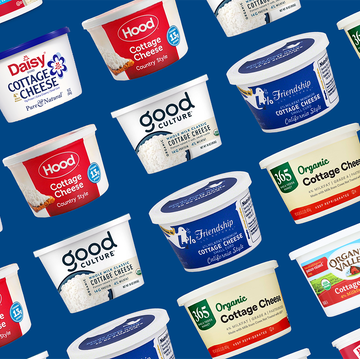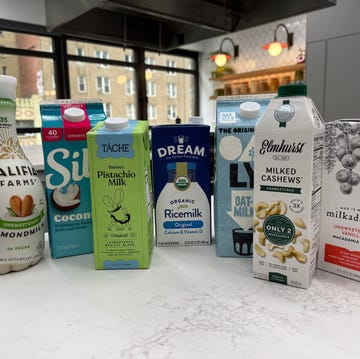Most of us reach for yogurt at least once or twice a week. Whether we’re blitzing it into a smoothie, grabbing it from the cold case at a local cafe, or shoving a cup into our bag as we run out the door on a busy morning, we opt for it because we’re confident in its stunning nutritional resume and relative ease of consumption—especially when we’re on the go.
But is it possible that we’ve become overconfident? Is yogurt really the nutritional powerhouse we believe it is? And, even if it is, is it possible to get too much of a good thing? As someone who personally LOVES yogurt (and eats it very often), I take these questions very seriously, so I took a deep dive into the topic, consulting two nutritionists and reading countless articles. Here’s everything you need to know:
Let’s talk about that STUNNING nutritional resume:
There’s no denying it: yogurt brings some amazing health benefits. According to registered dietitian Jessica Cording, dairy-based yogurt is a great source of calcium, vitamin B-12, riboflavin, potassium, and phosphorus. It also has a lot of protein (depending on the type and brand, a 5.3-ounce serving can contain up to 16 grams!) and, since most dairy in the United States is fortified with vitamin D, it’s a good source of that as well.
Many types of yogurt also contain probiotics, aka beneficial bacteria, which, according to registered dietitian Kim Yawitz, “help optimize the balance between good and bad microorganisms in your gut.” Yawitz shares that eating probiotic-rich yogurt can potentially help to “fend off intestinal infections, relieve symptoms of irritable bowel syndrome, and reduce the risk of colon cancer.” Between the gut health benefits, all those vitamins and minerals, and the boost of protein, it might seem like eating a cup of yogurt every morning is a win-win.
However . . . (let’s not get carried away!)
Not all yogurt is created equal. While yogurt can have great health benefits, its specific nutritional value vastly varies depending on what yogurt you’re consuming. For example, only some types of yogurt carry the live probiotics that are so good for the gut. Yawitz shares that most naturally-occurring probiotics in yogurt actually die when the yogurt is pasteurized, so the only types of yogurt that still contain them are those where the manufacturers have actually added the bacteria back into the yogurt after it was pasteurized. These refortified yogurts are set up to benefit our gut health; anything that doesn’t tout “live probiotics” on the packaging won’t do your gut any good.
In addition, a specific yogurt’s nutritional value can vary wildly depending on the amount of added sugar. According to Yawitz, a “seemingly innocent fruit-flavored yogurt” can contain “just as much added sugar as a serving of ice cream.” Don’t believe it? Check out the nutrition facts for this popular brand’s 6-ounce container of strawberry yogurt: it contains only 5 grams protein and a whopping 18 grams sugar. For comparison, a serving of this brand’s vanilla ice cream also contains (you guessed it!) 18 grams sugar. I don’t know about you, but given the option, I’d probably take the ice cream.
Clearly yogurt has the potential to be a great healthy option on any (and every) weekday morning, but it’s not necessarily a given.
So what do you buy?
There are a few good rules of thumb to follow when choosing your morning “cuppa yo’.” Here’s what to look for, whether you’re cruising the dairy aisle or snagging a container at your local coffee shop:
Go high-protein. Maximizing yogurt’s high-protein potential is especially important if you’re hoping to sustain your energy until lunch. Cording often recommends Greek or Icelandic-style yogurt since these varieties are both “higher in protein and will help you feel full for longer.” But she does note that these high-protein yogurts aren’t everyone’s favorite, and that if you prefers the texture of plain, non-Greek-style yogurt, you shouldn’t feel obligated to opt for it for the sake of a little extra protein. Instead, she recommends incorporating a little extra protein from other sources into that morning meal.
Avoid the added sugars. Unless you actually want dessert for breakfast (and there’s definitely a time and place for that!), follow Cording’s recommendation and opt for “unflavored” over flavored (i.e. sweetened) yogurts. But if you really hate plain yogurt, don’t despair: Cording recommends looking for lower-sugar options or ones that use “natural sugar alternatives like allulose, monk fruit, and stevia.” She also suggests plain and flavored yogurt together and gradually adjusting the ratios over time so “your tastebuds adjust.”
Keep it cultured. Make sure you’re actually getting all the probiotic benefits by checking the labels ensure your yogurt has been refortified with those bacteria. Yawitz recommends looking for products with the words “live and active cultures” on the label and specific strains of bacteria in the ingredients list.
Yogurt has the potential to be a highly healthy addition to your diet, but it’s absolutely not a given. Double check the label on your carton next time to make sure you’re doubling down on the full benefits of your morning cup of yogurt.













